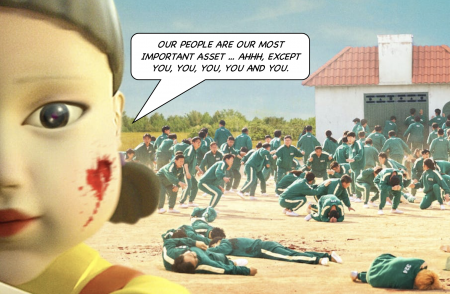Reduction in force
|
Reduction in force
rɪˈdʌkʃən ɪn fɔːs (n.)
(Also “RIF”)
The permanent removal of headcount — mass redundancy — usually targeted at that sweet spot in the organisation whose own reports aren’t so useless they can’t get by without supervision by someone who genuinely knows what is going on, and who aren’t so senior that they get to make decisions about who should be subject to a RIF. Usually, therefore, it is a means of taking out a swathe of mid-ranking subject matter experts.
Line management
A modern corporation is organised like an inverted, multilayer family tree, tracing back to great, great, great, great grandfather Hank. In lieu of parents we have line managers. Everyone, bar Grandad Hank himself, has at least one line manager: fortunate staff have only one — it ought to be plenty — les miserables further up in the stratosphere may also acquire a “dotted line” responsibility into someone else altogether. To continue the family tree analogy, this is a bit like having an open relationship with a distant uncle, and just as uncomfortable at family gatherings.
But we digress.
The basic job of line management is to supervise direct reports. Employees all have things to do besides supervising their direct reports, though a given worker’s proportion of line management to other stuff depends on that employee’s seniority. But the peril of supervising depends an awful lot on who you are supervising: with a novice employee, you can feel the same terror Grandma Gontrarian did when teaching the young JC to drive: right leg braced and jammed in the floor-well where the brake would, God willing, be; right hand loosely gripping the hand-brake, ready to yank, left hand grasping the door-handle, ready to judo-roll to safety should the need arise as her as her young cretin bunny-hopped around the university carpark. With an experienced and sensible hand, by contrast, line management is a dream; like sitting back with a cocktain under full spinnaker as a well drilled crew nimbly clambers about trimming sails. The theory is it should become more like riding a wing-foiling catamaran and less like being a driving instructor as seniority increases.
Roles change in three key ways the higher up the multi-level marketing scheme you go:
You get paid more: The more senior you are, the more lolly you take home. This news should not rock anyone’s world. Nor that the rate of increase in lolly is not linear, but exponential.
There are fewer of you: This stands to reason: there are lots of fungible Belarusian minions at the bottom taking home 30,000 rubles a year for carting around huge hunks of stone, occasionally getting squished, but — hey, hose down the rockface and get a new one. Only one Hank, flitting around the world in a corporate jet and speaking at Davos, but he takes home twenty-five mill. When you multiply take-home comp by rank title, it looks a bit like the snake who ate the elephant in Le Petit Prince.
You spend more time managing other people: We take this to be a trivial observation: the contractor at the call-centre in Belarus has no direct reports, so spends zero time-managing; the CEO ultimately has every direct report, so spends almost all her time line-managing. the gradations between are not inevitable — every firm has those grave, grand elders who float about sprinkling their ineffable magic on things, without having any portfolio in particular or any direct reports but as a rule the further up the chain you go, the more time you spend managing.
The people you manage need less management: It is equally trivial that the Belarusian contractor, fresh off the bus from the job-centre in Minsk, knows absolutely nothing but what he is told: his reliance upon his manager for practical guidance and the dispensation of wisdom and experience is vital; the forty-year industry veteran chief financial officer, who narrowly missed out on the CEO job herself, knows exactly what is expected of her, what to do, how to react to any crisis and has almost no need of guidance and instruction from the jammy sod who did get the big job.
Thus note a shift that takes place in line management as we ascend into the Gods: substance drops off, and form takes over. Line management becomes progressively more about documenting that it happens, exhibiting good governance to those in the risk control universe that want to see it.
